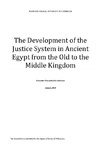LOKTIONOV, ALEXANDRE ALEXANDROVICH
This thesis investigates the longue durée evolution of judicial process in Ancient Egypt during the earlier periods of its history, namely the Old and Middle Kingdoms (c.2700-1700BCE). In doing so, it adopts a multifaceted approach encompassing not only detailed analysis of Egyptian textual sources, but also harnessing recent theoretical developments in legal anthropology and ethnographic comparanda from a variety of more recent Egyptian and wider African societies which appear to have parallels with the Ancient Egyptian model. A key argument proposed is that Egyptian justice exhibited a high degree of legal pluralism: it was exceptionally heterogenous throughout this period, with formal court process associated with elites co-existing alongside informal conflict resolution at community level. Moreover, the formal element of justice, which is easier to study due to its far greater prevalence in the textual record, appears to have gone through a fundamental transformation during the millennium covered by this PhD. This led to the emergence of highly specialised judicial practitioners in the Middle Kingdom, in contrast to the Old Kingdom where officials involved in justice usually had a plethora of other responsibilities. Furthermore, the Middle Kingdom appears to have seen a greater emphasis on recorded law. On the other hand, the close connection between justice and specific places of dispensing it, such as the Hw.t-wr.t (‘great enclosure’) and the wsx.t (‘broad court’) weakened substantially in the Middle Kingdom when compared to the preceding period. The thesis argues that these changes were triggered by major societal upheaval during the political fragmentation of the First Intermediate Period (c.2180-2050BCE), and had major implications for the long-term administration of formal justice in the state. The eventual outcome was a judicial framework which had shifted from what the thesis terms ‘true legal pluralism’ in the Old Kingdom to a ‘unified pluralistic legal system’ in the Middle Kingdom, the latter being an environment where legal principles still exhibited some variation, but were overall more uniform than in earlier times. The core dataset for the thesis is prosopographic in nature, consisting of the title strings of officials involved in the two key concepts connected to the administration of justice in this time period: wDa-mdw and sDm. These title strings are obtained from a range of sources, including tomb inscriptions, stelae, seals, and graffiti. Alongside this core, evidence from a number of papyri is used to shed light on what particular judicial offices may have entailed, or what locations were used as judicial venues. Finally, a selection of ethnographic descriptions of much more recent judicial practices from Egypt, observed by 19th and early 20th Century writers, are also included, as are allusions to justice in other African societies of comparative relevance. The ethnographic data and associated legal theory allow the thesis to cautiously fill in the blanks left by the textual evidence from Ancient Egypt itself, leading not only to a more comprehensive understanding of judicial evolution in the period studied, but also highlighting its potential connections to other, more recent societies.Keywords
Old Kingdom, Middle Kingdom, First Intermediate Period, Legal History, Legal Anthropology, Prosopography, Customary Law, Egyptology, Law courtsSponsorship
Primary Funders: Arts & Humanities Research Council (AHRC) - Cambridge Doctoral Training Partnership (DTP) (Grant Reference Number AH/L503897/1); Robinson College Lewis Scholarship Additional Funders (research visits): Santander Mobility Grant Scheme (Banco Santander & International Student Office, University of Cambridge) Berner Altorientalisches Forum (University of Bern) Robinson College Graduate Conference AllowanceIdentifiers
This record's DOI: https://doi.org/10.17863/CAM.39378Rights
All rights reserved, All Rights ReservedLicence URL: https://www.rioxx.net/licenses/all-rights-reserved/
Advisors
PAPAZIAN, HRATCHDate
2019-05-18Awarding Institution
University of CambridgeAuthor Affiliation
Department of ArchaeologyQualification
Doctor of Philosophy (PhD)Language
EnglishType
Thesis










 Stumble It!
Stumble It!

No comments:
Post a Comment